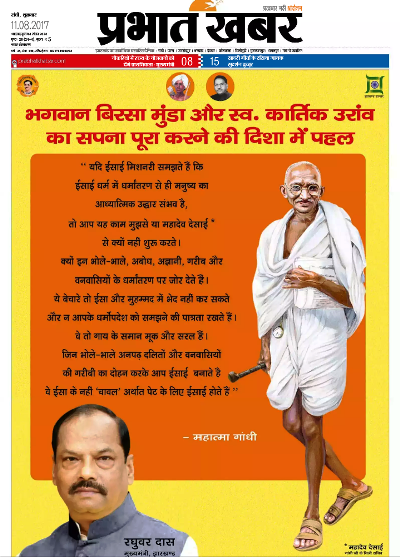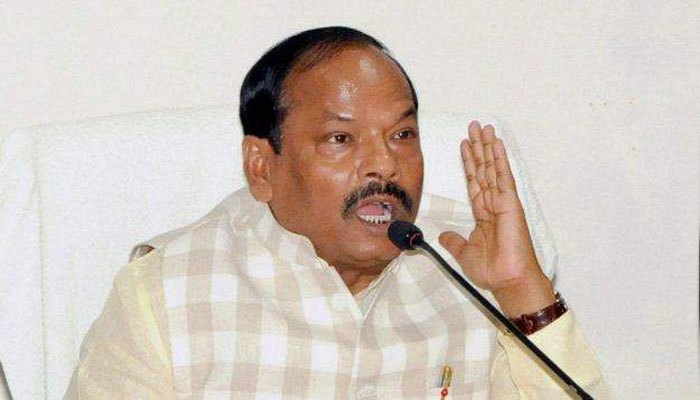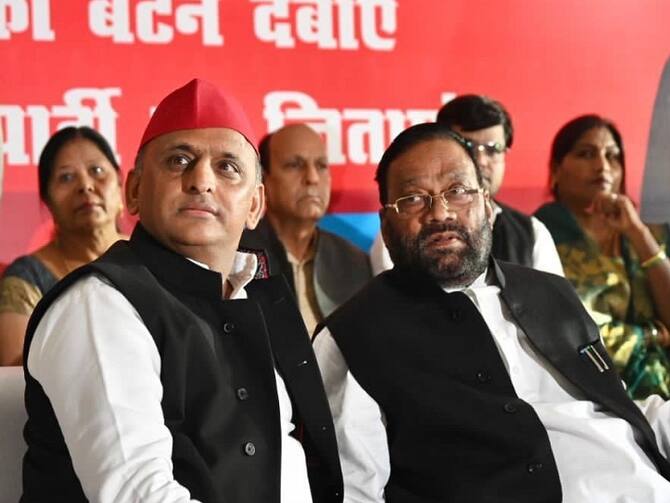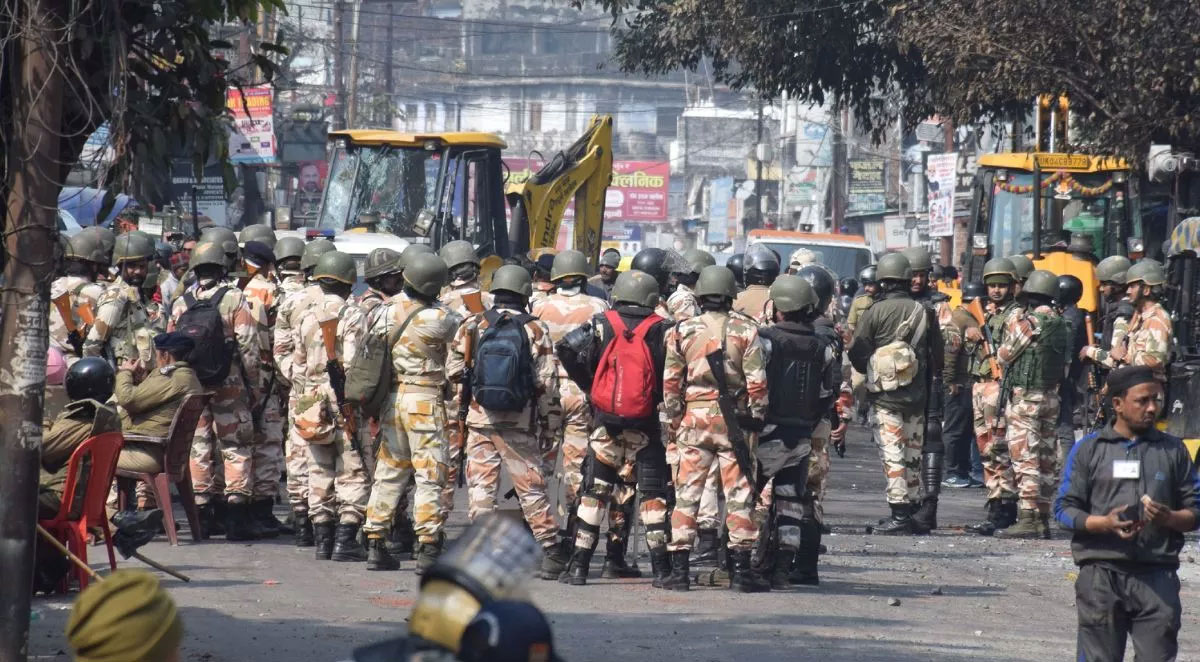A full-page advertisement published in newspapers by the Information and Public Relations Department of the Government of Jharkhand came as a shocker to the people. The advertisement carried a large photograph of Mahatma Gandhi and a smaller one of the chief minister Raghubar Das. The advertisement went on to say that Gandhiji doubted that serving society was the motive of the Christian missionaries, taking selective extracts from a conversation he had with a missionary leader. In fact, the conversation pertained to the conversion of Untouchables at a time when Ambedkar threatened to join another faith with 50 million of them in tow; it had no reference to Adivasis or Vanvasis (Gandhi Heritage Portal, vol 64, pp 33-41).

Interestingly, the advertisement was issued a day before the Jharkhand Government succeeded in getting the assembly to pass the Religious Freedom Bill 2017. The Bill prescribes a penalty of seven years in jail and/or a fine of Rs 1 lakh for converting anyone to another religion through force or inducement. That is not all. A person converting voluntarily would have to inform the deputy commissioner concerned of his decision. So, now, the Tribals of Jharkhand suddenly seem to be educated enough to be aware of their rights, so much so that they can be expected to visit the Deputy Commissioner’s office and submit an application for converting to another religion.
Land grab!
But the real motive of the Jharkhand Government was different. It knew that the Bill would trigger a furore and a bitter debate on conversions and religious freedom. And amid that hullaballoo, it would quietly obtain the assent of the assembly for a Bill that makes grabbing the land of Tribals easier. And it succeeded eminently.
The Jharkhand Assembly passed in the monsoon session the “Adhisuchit Bhoomi Arjan, Punarvasan Evum Punah Vyavasthapan Mein Uchit Pratikar Aur Pardarshita Ka Adhikar (Jharkhand) Amendment Bill” (Notified Land Acquisition, Right to Fair Compensation and Transparency in Rehabilitation and Resettlement (Jharkhand) Amendment Bill). This was a cakewalk as the BJP enjoys a clear majority in the House. The government had earlier amended the Chotanagpur Tenancy Act and the Santhal Tenancy Act in the budget session, despite former chief minister Arjun Munda and former deputy speaker of the Lok Sabha Karia Munda – both senior BJP leaders – voicing their opposition. The stiff opposition led to Governor Droupadi Murmu withholding assent to the twin amendment bills. She sent them back to assembly for reconsideration on 25 June 2017.

The tough stand of the governor forced the Raghubar Das Government on the back foot. If its critics are to be believed, the government had amended the Acts at the behest of corporate heavyweights, who wanted norms related with acquisition of land relaxed. Since the government had its hand tied by the governor’s refusal to sign the amendments, the government decided to bring the changes through the backdoor. Opposing the new measure, leader of opposition Hemant Soren told the assembly that the real objective of the state government was to permit land-grabbing. The government, he alleged, wanted to forcibly acquire the land of the Tribals and hand it over to select industrial groups and capitalists.
Incredibly, the Bill says that the law will be treated as having come into force on 1 January 2014 (more than three years ago!). Supriyo Bhattacharya, general secretary and spokesperson of the Jharkhand Mukti Morcha (JMM), challenged the constitutionality of the Bill. According to the Constitution, a state government can bring changes to a Bill passed by the Parliament only within a year of its passage and that too only with the approval of the President.
Bhattacharya cited sub-clause 3 of clause 1 of the Bill: “Notwithstanding any order or decree of any court or tribunal, the provisions of this Amendment Act would apply.” Thus, the provisions of the Bill have been placed out of the purview of the Indian Constitution and the judiciary and hence cannot be challenged at any level in the courts of law, thus depriving the affected persons and groups of their Constitutional right to seek justice.
“Jharkhand figures in the Fifth Schedule of the Constitution and the government can acquire no land without the assent of the Gram Sabha,” Bhattacharya said. “But the Bill has done away with this provision of the mandatory consent of the Gram Sabha. This is a clear violation of the provisions of the Panchayats (Extension to the Scheduled Areas) Act 1996 and the Supreme Court’s 1997 judgment in the case of Samatha vs State of Andhra Pradesh.” He added, “Once the Bill becomes a law, the government will have the power to acquire even multi-crop land. This would be a fatal blow on Jharkhand’s agricultural economy. Only 20 per cent of the state’s farmers own multi-crop land and 80 per cent of the state’s population is dependent on it.”
Anti-conversions bill
Now, coming to the anti-conversions Bill, section 3 declares forced conversion illegal and stipulates imprisonment up to three years and/or a fine of up to Rs 50,000 for the violators. If the crime is committed against a minor, a woman or a person belonging to the SCs or the STs, the term of imprisonment may extend up to four years and a fine of up to Rs 1 lakh. In case of voluntary conversions, the person concerned will have to compulsorily inform the local administration of the place and time of the conversion and the witnesses. Failing to comply with this rule will attract a severe penalty.

This Bill has drawn flak from many quarters. Jharkhand Mukti Morcha’s Stephen Marandi said, “The Bill should be sent to a select committee of the assembly. It is violative of the fundamental rights of citizens. Every citizen is free to practise and profess the religion of his choice.” He has also asked the government to reveal how many cases of conversions have so far been reported from the state and how many cases against forced conversions have been registered under the IPC. “The name ‘Religious Freedom Bill’ is a misnomer,” Marandi said. “It should be called ‘Anti-Conversion Bill’. Section 294A of the IPC already stipulates punishment for forced conversions.” Marandi also has reservations about the Bill requiring a person converting to another religion – which is a ‘sensitive issue – to inform the government.
Participating in the debate, BJP MLA Radhakrishna Kishore said, “The issue of conversions needs to be debated in a more comprehensive manner. The Bill is overdue by at least 15 years but better late than never. I congratulate the government for tabling the bill and for its clear and precise provisions. Now, the government should ensure that the bill is implemented sincerely once it becomes a law. It is wrong to make a person change his religion by luring him with food. Sati and child marriages were declared illegal through legislation and remarriage of widows was allowed. The number of Christians in the state had grown by almost 30 per cent from 10,90,283 in 2011 to 14,18,783 now. Jharkhand has witnessed the highest number of conversions to Christianity among all the states.”
On the other hand, Babulal Marandi, the first chief minister of Jharkhand and leader of Jharkhand Vikas Morcha, sees the Bill as an encroachment on the fundamental rights of the citizens. “The Indian Constitution allows every citizen to freely practise, profess and propagate his religion,” he said.
Hemant Soren said that no one can or does become a Christian only by studying in a Christian missionary school or getting treatment in a hospital run by a missionary. “I had studied in a missionary school but I continue to be a Hindu,” Soren said. “The Bill violates Article 25 of the Constitution, which guarantees freedom of religion to all citizens of the country.”
Be that as it may, the anti-conversion Bill is more in the news than the land acquisition Bill. The local media is caught up in debates and discussions on the anti-conversion bill. Clearly, the objective is to obscure the sinister import of the land bill. But the government’s move is being opposed. The opposition parties have written to the Governor, requesting her not to approve the two bills.
Forward Press also publishes books on Bahujan issues. Forward Press Books sheds light on the widespread problems as well as the finer aspects of Bahujan (Dalit, OBC, Adivasi, Nomadic, Pasmanda) society, literature, culture and politics. Next on the publication schedule is a book on Dr Ambedkar’s multifaceted personality. To book a copy in advance, contact The Marginalised Prakashan, IGNOU Road, Delhi. Mobile: +919968527911.
For more information on Forward Press Books, write to us: info@forwardmagazine.in





